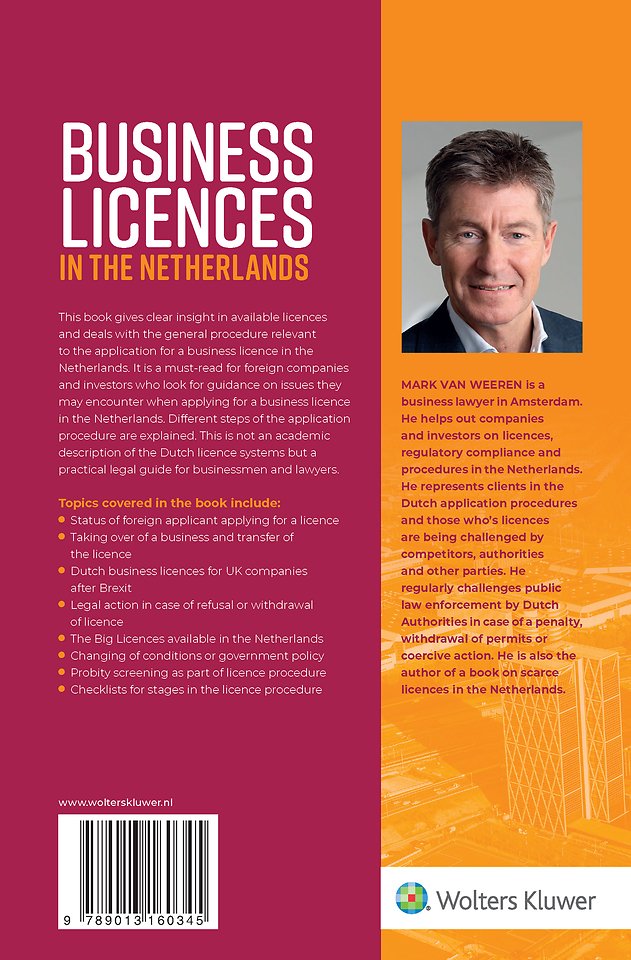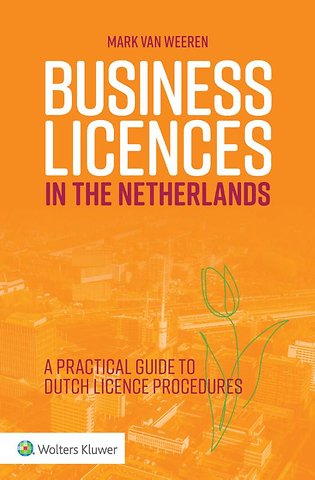



Mark van Weeren is advocaat in Amsterdam, verbonden aan Blenheim Advocaten. Het advocatenkantoor streeft er naar via Blenheim Academy kennis en expertise van de advocaten door opleiding en publicaties te verbeteren en kennis te delen.
Meer over Mark van WeerenBusiness Licences in the Netherlands
A Practical Guide to Dutch Licence Procedures
Paperback Engels 2021 1e druk 9789013160345Samenvatting
Business Licenses in the Netherlands offers crucial guidance to successfully obtain a Dutch licence and survive the licence procedure. The practical tips and best practices are invaluable to foreign companies and investors who want to remain one step ahead of any issue they may encounter when applying for a business licence in the Netherlands.
You gain a deep yet highly practical understanding of each step of the application procedure. This is not an academic description of the Dutch licence systems, but a practical legal guide for business entrepreneurs and lawyers.
Dutch license procedure
The publication explores important steps and themes that are vital to applying for a business license in the Netherlands. The author covers every issue you need to be aware off in order to successfully obtain a Dutch busines license:
- Status of foreign applicant applying for a licence
- Taking over of a business and transfer of the licence
- Dutch business licences for UK companies after Brexit
- Legal action in case of refusal or withdrawal of licence
- The Big Licences available in the Netherlands
- Changing of conditions or government policy
- Probity screening as part of licence procedure
- Checklists for stages in the licence procedure
Trefwoorden
Specificaties
Lezersrecensies
Inhoudsopgave
U kunt van deze inhoudsopgave een PDF downloaden
1. AN INTRODUCTION TO BUSINESS LICENCES IN THE NETHERLANDS 1
1.1 General procedure for requiring a licence 1
1.2 ‘Licence’ further defi ned 1
1.3 Licensed sectors 2
1.4 Status of foreign applicant 3
1.4.1 UK Companies after Brexit 4
1.5 Import restrictions 5
1.6 Scarce permits and special procedures 6
1.7 An ‘establishment’ under Dutch environmental legislation 6
1.8 Examples of authorisation schemes 7
1.9 Formalities for applying for a licence in the Netherlands 9
2. BIG LICENCES IN THE NETHERLANDS 11
2.1 Export licences 11
2.2 Licence for fi nancial services 12
2.2.1 Licence for a financial service provider 12
2.2.2 Licence for crypto service providers 13
2.3 Licences for gambling 14
2.3.1 Remote gambling 14
2.3.2 Licence applications for remote gaming providers 15
2.3.2.a The Ksa licence application procedure 15
2.3.3 Lotteries 16
2.3.3.a Charity lottery with licensed game of chance, an example 16
2.3.4 Dutch casinos 17
2.4 Licences for selling cannabis 18
2.4.1 Sale of cannabis in coffeeshops 18
2.4.2 The experiment closed coffeeshop chain – the Dutch government’s weed experiment 18
2.4.3 Exemptions from the Opium Act 19
2.4.3.a Authorisation for medicinal cannabis 20
2.4.4 Export from the Netherlands 21
2.4.5 Import to the Netherlands 21
2.4.6 CBD products 21
2.5 Scarce licences 21
2.6 Events and festivals 23
2.7 Real estate projects and property development 24
2.8 Authorisation to takeover or merger 25
2.9 Concessions - telecom and radio frequencies 27
2.9.1 Telecom: 4G and 5G 28
2.9.2 Radio stations 28
3. THE LICENCE APPLICATION PROCEDURE 31
3.1 Requirements for submission of licence application 31
3.2 Incomplete application; withheld from consideration 31
3.3 Suspension of decision period 32
3.4 Decision period after request 33
3.5 Consequences of not deciding in time 33
3.6 Notice of default in the event of failure to decide in good time 34
3.7 The authorised decision or the rejection of the application 35
3.8 A licence by operation of law 35
4. DURATION OF LICENCE AND ARRANGEMENTS FOR RENEWAL 37
4.1 Length of a licence 38
4.2 No right to automatic renewal 39
4.3 Article 12 Services Directive: natural or technical scarcity 39
4.4 Duration of authorisation or right of renewal in relation to investment authorisation holder 40
4.5 Transitional period before arriving at a valid distribution procedure 41
5. COSTS OF LICENCES 43
5.1 Handling fees for environmental licence application 43
5.2 Consultation prior to an application 44
5.3 Claiming a refund of fees or raising an objection 45
5.4 Fees in the case of a licence granted by operation of law 45
5.5 Yearly fees for supervision of fi nancial licence 46
6. TRADING AND TRANSFERRING OF A LICENCE 49
6.1 Request for change of name 49
6.2 Types of permits 49
6.3 The transferability of a number of licences 50
6.4 Exception: merger or transfer of shares licencee 52
6.5 Methods of transfer, transition, etc. 52
6.6 Trading licences 53
6.7 Probity screening in case of transfer or change of name of licence holder 54
7. LICENSING REQUIREMENTS AND A CHANGE IN CIRCUMSTANCES OF THE LICENCE HOLDER 55
7.1 Requirement or information notice? 55
7.2 Prohibited requirements in licence procedures 56
7.3 Modifi cation of the conditions of the licence holder 57
7.4 Change (of name) of the licence holder 58
8. ADMINISTRATIVE LICENSING POLICY 61
8.1 Legal criteria for policy rules 61
8.2 Policy on scarce licences 62
8.3 Deviating from policy 62
8.3.1 Deviating from policy with a view to proportionality; the view of the Council of State 63
8.4 Review of policy rules by the courts 63
8.5 Declare policy ineff ective or deviate from policy 64
9. MODIFICATION OF LICENCE CONDITIONS DUE TO POLICY AND AMENDED LEGISLATION 65
9.1 Modifi cation of licence requirements due to a policy change 65
9.2 New circumstances; obligation to update 66
9.3 New policy automatically applying to existing licence? 66
9.4 Amendment of rules and legal principles 67
9.4.1 Notification of a decision to a licence holder that a new policy applies - ex officio amendment 67
9.5 Amendment in the form of revocation/amendment of one or more regulations 68
9.6 Self-application for amendment of rules 68
9.7 Examples of unjustifi ed conditions or regulations 68
9.8 Change of policy during application procedure 69
9.9 Power to deviate from (new) policy 69
10. PROBITY SCREENING (THE BIBOB ACT) AND ‘BAD LIVING BEHAVIOUR’ 71
10.1 Authorities involved in probity (Bibob) procedure 71
10.2 An administrative body’s own integrity investigation 72
10.3 Investigation Probity Screening Agency (National Bibob Bureau or NBB) 73
10.4 Advice by the Probity Screening Agency 74
10.5 Extension of Bibob test 74
10.6 Subsidiarity and proportionality principles 74
10.7 Participation in probity investigation 75
10.8 Qualifi cation of ‘bad living behaviour’ and Catering licence 75
10.9 Objecting to a Bibob decision 76
11. SERVICES ACT AND SERVICES DIRECTIVE 77
11.1 Services covered by the Services Directive and the Services Act 77
11.2 General rules for authorisation schemes 78
11.3 Defi nition of a licence according to the Services Directive 80
11.1.3 Criteria for authorisation schemes (article 9 Services Directive) 80
11.4 Limitation of a licence’s period of validity 80
11.5 Selection procedure for scarce licences due to limited space or technical limitations 81
11.6 Prohibited licence or waiver requirements 82
11.7 Necessary information provided by the Service Desk 82
11.8 Checklist for service licence applicant 83
12. REFUSAL AND WITHDRAWAL OF A LICENCE 85
12.1 Administrative grounds for refusal 85
12.2 Ground for refusal concerning the applicant’s status 86
12.2.1 Negative Bibob advice as a ground for refusal or withdrawal 86
12.3 Intended decision to refuse a licence 86
12.4 Refusal/withdrawal and principles of good administration 87
12.5 Judge’s review of refusal/revocation decision 88
12.6 Judicial review of applicable rules 88
12.7 Grounds for revocation of a licence 89
12.8 Withdrawal due to error in the granting of a licence 89
12.9 Examples of incorrect refusal/withdrawal 90
12.10 Withdrawal of authorisation and European law 92
13. LITIGATION ON LICENCES AND LEGAL PROTECTION 95
13.1 Objection procedure 95
13.2 Committee advice on objection 96
13.3 Decision period 97
13.4 Interim injunction in case of urgent situation 98
13.5 Review of decision by administrative court in preliminary relief proceedings 99
13.6 Higher appeal to the Council of State 100
13.7 Annulment of decision by the administrative court 101
14. DISTRIBUTION OF SCARCE LICENCES 103
14.1 Three obligations according to the principle of equality and Article 12 of the Services Directive 104
14.2 Traditional methods for distributing permits 105
14.3 Outline of a scarce licence procedure 106
15. PRACTICAL INFORMATION FOR DOING BUSINESS IN THE NETHERLANDS 109
15.1 Hiring advisers and specialists 109
15.2 How to shape a partnership with a business partner 110
15.3 Three golden rules when you start up your business 110
15.4 Support from the Netherlands Foreign Investment Agency (NFIA) 111
15.5 Fiscal climate in the Netherlands 111
15.6 Subsidies and programmes 112
15.7 Interesting links on starting a business in the Netherlands 113
15.8 Practical links on business activities in the Netherlands 113
15.9 Government information on starting your own business 116
16. DUTCH CONTRACT PRINCIPLES TO BE AWARE OF 119
16.1 Negotiation stage and possible consequences 119
16.2 Principle of reasonableness and fairness in Dutch contract 120
16.3 Breach of contract under Dutch Law 121
16.4 Termination of agreement in the Netherlands 123
16.5 Time Limits on Enforcing Dutch Contract 124
INDEX
Glossary of terms 125
Index 135
ANNEXES
1 Licence validity checklist (art. 33 Services Act) 145
2 Checklist for establishing the existence of an authorisation scheme 146
3 Checklist for scarce licences 147
4 Checklist: indicators as to whether a licensing procedure for economic activity (service) complies with the rules 148
5 Checklist for disallowing licence applications (art. 4:5 Awb) 149
6 Checklist for the decision period for an application and permit by operation of law (economic activity/service) 150
Anderen die dit boek kochten, kochten ook
Rubrieken
- advisering
- algemeen management
- coaching en trainen
- communicatie en media
- economie
- financieel management
- inkoop en logistiek
- internet en social media
- it-management / ict
- juridisch
- leiderschap
- marketing
- mens en maatschappij
- non-profit
- ondernemen
- organisatiekunde
- personal finance
- personeelsmanagement
- persoonlijke effectiviteit
- projectmanagement
- psychologie
- reclame en verkoop
- strategisch management
- verandermanagement
- werk en loopbaan





